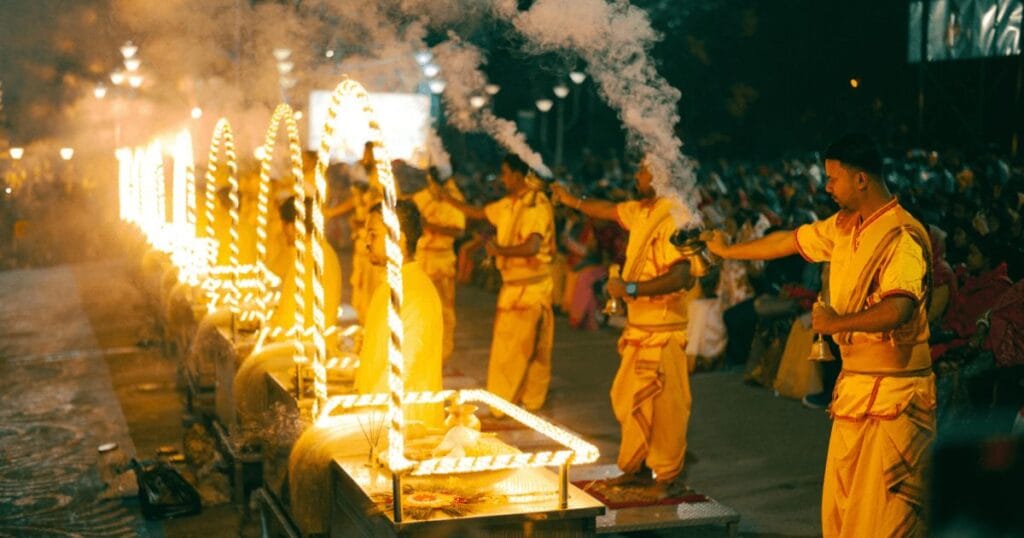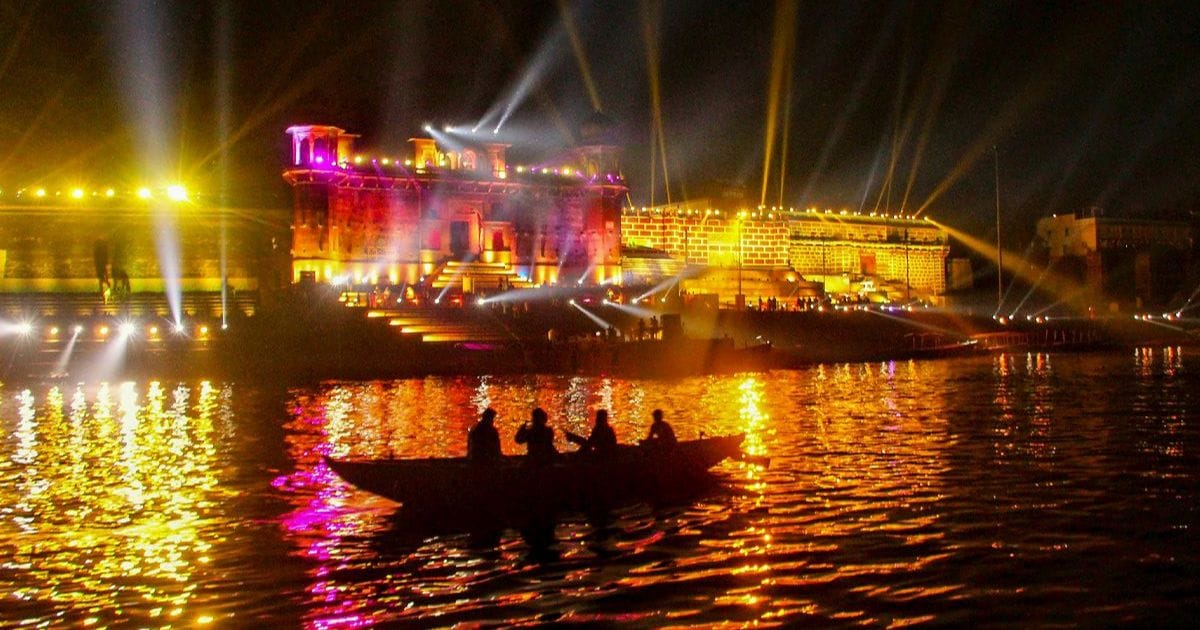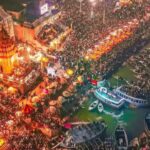Discover the significance of Dev Deepawali in Hindu culture—why gods descend, Ganga Aarti, diyas on the ghats, and rituals honoring light, ancestors, and hope.
Dev Deepawali, known as the “Diwali of the Gods,” stands as one of the most spiritually magnificent festivals in Hindu culture. This sacred celebration, occurring fifteen days after the traditional Diwali on the full moon night of Kartik Purnima, transforms the holy city of Varanasi into a luminous spectacle that captivates devotees and visitors from across the globe. The significance of Dev Deepawali extends far beyond its visual splendor, representing deep-rooted spiritual traditions that have been preserved for centuries in Hindu culture.
Origins and Mythological Foundation
The significance of Dev Deepawali traces back to ancient Hindu scriptures and mythological narratives. According to Hindu tradition, this auspicious day commemorates Lord Shiva’s victory over the demon Tripurasura, when the gods descended to earth to celebrate this divine triumph. The festival is believed to be the day when celestial beings come down to bathe in the sacred Ganges, making it one of the holiest occasions in Hinduism.
Dev Deepawali Varanasi holds particular importance because Varanasi, also known as Kashi, is considered the city of Lord Shiva. The mythological connection suggests that on this night, all gods gather in Varanasi to pay homage to Lord Shiva and participate in the grand celebration. This divine congregation makes the festival extraordinarily sacred, as devotees believe that witnessing or participating in Dev Deepawali brings immense spiritual merit and divine blessings.
The festival also marks the return of Lord Vishnu from his four-month cosmic sleep (Chaturmas), adding another layer of spiritual significance. This awakening of Lord Vishnu is celebrated with great fervor, as it signifies the resumption of all auspicious activities and ceremonies that were paused during the monsoon period.

Cultural and Spiritual Significance in Hindu Culture
In Hindu culture, Dev Deepawali represents the triumph of light over darkness, good over evil, and knowledge over ignorance. The festival embodies core Hindu philosophical concepts, including the eternal struggle between divine and demonic forces, the importance of dharma (righteousness), and the power of collective devotion.
The lighting of diyas (oil lamps) during Dev Deepawali symbolizes the removal of spiritual darkness from one’s life. Each flickering flame represents a prayer, a hope, and a connection to the divine. The practice of lighting thousands of lamps creates a mesmerizing visual metaphor for enlightenment, where individual consciousness merges with universal consciousness.
The significance of Dev Deepawali in Hindu culture extends to its role as a community celebration that brings people together regardless of their social, economic, or regional backgrounds. The festival promotes unity, devotion, and shared spiritual experiences that strengthen the fabric of Hindu society. It serves as a reminder of the collective responsibility to preserve and practice ancient traditions while adapting to modern times.
Dev Deepawali Varanasi: The Epicenter of Celebration
Dev Deepawali Varanasi represents the most spectacular and authentic celebration of this festival anywhere in the world. The ancient city, with its numerous ghats (riverfront steps) along the Ganges, provides the perfect backdrop for this divine celebration. On the night of Dev Deepawali, over one million diyas illuminate the ghats, creating a breathtaking panorama that reflects the spiritual essence of Hinduism.
The preparation for Dev Deepawali Varanasi begins weeks in advance, with local communities, religious organizations, and government bodies working together to ensure a magnificent celebration. Each ghat takes on a unique character, decorated with elaborate rangoli designs, flower arrangements, and artistic installations that tell stories from Hindu mythology.
The ghats of Varanasi, including Dashashwamedh Ghat, Assi Ghat, Manikarnika Ghat, and dozens of others, become stages for devotional activities. Pilgrims and tourists gather to witness the transformation of the cityscape into a divine realm, where earthly concerns fade away in the presence of overwhelming spiritual energy.
Ganga Aarti Varanasi: The Soul of Dev Deepawali
The Ganga Aarti Varanasi during Dev Deepawali represents one of the most powerful and moving spiritual experiences in Hindu culture. This elaborate prayer ceremony, performed with brass lamps, incense, and devotional chanting, creates an atmosphere of profound reverence and connection to the divine.
During Dev Deepawali, the Ganga Aarti Varanasi takes on heightened significance as multiple aartis are performed simultaneously across different ghats. The synchronized movement of flames, the resonant chanting of Sanskrit mantras, and the participation of thousands of devotees create a collective spiritual experience that transcends individual boundaries.
The aarti ceremony honors the Ganges as a goddess and divine mother, acknowledging her role in purifying souls and granting liberation (moksha). The significance of Dev Deepawali is deeply intertwined with this reverence for the Ganges, as the festival celebrates the divine presence within the sacred river. Devotees believe that participating in or witnessing the Ganga Aarti during Dev Deepawali multiplies the spiritual benefits manifold.
Rituals and Traditions
The celebration of Dev Deepawali involves numerous rituals and traditions that have been passed down through generations. Devotees begin the day with a holy dip in the Ganges before sunrise, believing this act purifies them of sins and brings divine blessings. The ritualistic bathing is followed by prayers and offerings to Lord Shiva and other deities.
Throughout the day, pilgrims visit various temples in Varanasi, offering prayers and seeking blessings. The Kashi Vishwanath Temple, dedicated to Lord Shiva, receives thousands of devotees who come to pay their respects on this auspicious day. The temple complex bustles with activity as priests conduct special pujas (prayer ceremonies) and devotees participate in religious discourses.
As evening approaches, the main celebration begins with the lighting of diyas. Families, community groups, and religious organizations collaborate to place oil lamps along the ghats, creating geometric patterns and designs that enhance the visual appeal of the celebration. The act of lighting lamps is considered a form of devotion, where each person contributes to the collective offering to the divine.
Modern Celebrations and Cultural Preservation
In contemporary times, Dev Deepawali Varanasi has evolved to accommodate modern conveniences while preserving its traditional essence. The festival now attracts international visitors, cultural enthusiasts, and spiritual seekers from around the world, making it a significant cultural ambassador for Hindu culture and Hinduism.
Tourism organizations and cultural institutions work together to ensure that the influx of visitors doesn’t compromise the sanctity of the celebration. Educational programs, guided tours, and cultural exhibitions help visitors understand the deeper significance of Dev Deepawali beyond its visual spectacle.
The festival has also embraced technology for better organization and safety, with digital platforms helping manage crowd control, provide information to visitors, and document the celebrations for posterity. Despite these modern additions, the core spiritual and cultural elements remain unchanged, ensuring that Dev Deepawali continues to serve its primary purpose of connecting devotees with the divine.
Economic and Social Impact
Dev Deepawali Varanasi significantly contributes to the local economy, providing livelihoods for thousands of people involved in tourism, hospitality, handicrafts, and religious services. Local artisans create beautiful diyas, flower garlands, and religious artifacts specifically for the festival, helping preserve traditional craftsmanship while meeting contemporary demands.
The festival also promotes cultural exchange and understanding, as visitors from different backgrounds come together to witness and participate in this Hindu celebration. This interaction helps break down cultural barriers and promotes global appreciation for Hindu culture and Hinduism.
Hotels, restaurants, and transportation services experience peak demand during Dev Deepawali, contributing significantly to Varanasi’s economy. Many businesses plan their annual strategies around this festival, recognizing its importance as both a religious celebration and a major tourism event.
Environmental Considerations and Sustainability
Modern celebrations of Dev Deepawali increasingly focus on environmental sustainability while maintaining traditional practices. Organizations promote the use of eco-friendly diyas made from clay instead of non-biodegradable materials, and encourage the use of natural oils for lighting.
The Ganga Aarti Varanasi ceremonies now incorporate messages about river conservation and environmental protection, educating participants about their responsibility to preserve the sacred Ganges for future generations. These efforts ensure that the spiritual significance of the festival aligns with contemporary environmental consciousness.
Conclusion
The significance of Dev Deepawali in Hindu culture encompasses spiritual, cultural, social, and economic dimensions that make it one of the most important festivals in Hinduism. Dev Deepawali Varanasi serves as the epicenter of this celebration, where ancient traditions meet modern realities while preserving their essential spiritual character.
The magnificent Ganga Aarti Varanasi during Dev Deepawali creates an unforgettable experience that connects participants with centuries of devotional tradition. As thousands of diyas illuminate the ghats and the sacred Ganges flows serenely, the festival reminds us of the enduring power of faith, community, and cultural preservation.
For those seeking to experience the authentic significance of Dev Deepawali, Varanasi offers an unparalleled opportunity to witness Hindu culture at its most magnificent. The festival continues to inspire spiritual seekers, cultural enthusiasts, and curious travelers, ensuring that this ancient tradition remains vibrant and relevant for future generations.
Experience the divine magnificence of Dev Deepawali with TripCosmos.co – your trusted partner for authentic spiritual journeys in Varanasi. From witnessing the mesmerizing Ganga Aarti to exploring sacred temples and participating in traditional celebrations, our expert team ensures unforgettable experiences. Contact us at +91-9336116210 or visit www.tripcosmos.co to plan your spiritual pilgrimage to the holy city of Varanasi.





